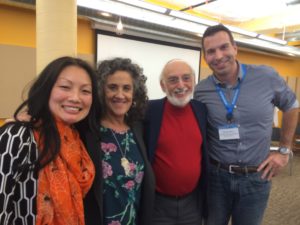We have experienced the deep fulfillment and inevitable disappointments in our own marriage and know the importance of having a clear map to navigate the complex and challenging territory of committed relationships.
We use two primary models of treatment which are each grounded in decades of lab and clinical research: Gottman Method Couples Therapy & Emotionally Focused Couples Therapy. In cases of infidelity, we also supplement our work together with the Gottman Trust Revival Method.

Faith & George at a training with Drs. Julie & John Gottman.
We also tailor treatment to the unique needs of each couple and measure progress during each session, to ensure therapy is creating real and lasting change.
Below are the core phases of couples therapy for most of our clients with links to some important concepts, if you’re interested in exploring them further. All of these concepts can be found in Hold Me Tight, 7 Principles for Making Marriage Work, and What Makes Love Last?.
Couples therapy typically requires 12-20 (weekly or every other week) sessions, with maintenance sessions as-needed. Couple seeking relationship enrichment may need fewer session and those recovering from an affair or dealing with co-occuring challenges (e.g., trauma, depression) may need more to produce lasting change.
Supplementing couples therapy with a psychoeducational workshop to speed progress and reduce relapse is also recommended, though not required.
Phase I: Assessment & Cycle De-Escalation
During this phase, you and your partner will complete a comprehensive assessment that looks at the strengths and growth areas in your relationship, along with individual areas related to depression, anxiety, substance use, emotional expression, etc. The first session is also about getting to know you and visa versa and gaining a sense of your goals and needs for couples therapy.
We’ll then work together to identify the negative cycle that is creating distance in your relationship, while also identifying strategies that will de-escalate the cycle, including reducing the 4 Horsemen, creating a time-out ritual when flooded, and beginning to identify primary emotions and needs underneath the negative cycle.
We’ll also give you the tools to begin effectively repairing conflict in-between sessions, while taking steps to nurture friendship and fondness and admiration in your relationship (the more positivity there is in your relationship, the easier it is to navigate conflict and past wounds).
Phase II: Creating New Connections
Once you and your partner have a clear sense of the negative cycle and view the cycle as the shared enemy (as opposed to each other), that’s a good sign that it’s time to move on toward identifying and sharing more of your underlying needs and feelings with each other, while continuing to nurture a sense of acceptance and security with one another.
This is also often the time when any gridlocked issues related to parenting, sex, money, family, etc. can be discussed in a new a more productive manner- where you’re accepting influence from each other, working toward effectively compromising, and exploring you and your partner’s deeper values, dreams, and goals beneath any differences.
During the time, you’ll also be establishing habits of connection and reinforcing the underlying friendship and bond in the relationship (see the Magic 6 Hours per Week).
Throughout the process, we use valid and reliable measures to track session-to-session progress and to ensure that therapy is also focused on your goals, that our approach is tailored to your unique needs, that you and your partner feel heard and understood, and that therapy is progressing in the right direction. Creating this culture of feedback allows us to ensure that we’re providing the highest level of care possible and making the best use of our time together.
At the end of the therapy, you’ll emerge with a much more solid and stable “Sound Relationship House” where you and your partner are able to:
- nurture your friendship as you enhance your Love Maps,
- express fondness and admiration,
- turn toward each other (instead of turning away) during everyday moments,
- enhance a feeling of positivity and gratitude in the relationship,
- manage communication and conflict effectively and heal from past wounds,
- support each other’s personal goals and dreams,
- and create habits of connection that will maintain your positive momentum.
We know that relationships are complicated and relationship issues are painful. We also know that most of these issues, issues that can often lead to break up, are natural, understandable, and often able to be resolved through counseling.
Thank you for the taking the time to read about our approach. Please don’t hesitate to let us know if you have any questions.
